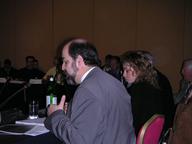Bruce Tonkin's GNSO report at the public forum was a masterpiece both in terms of public speaking and analysis.
Tonkin starts by noting that litigation is moving decision-making to a different forum. It means decision-making mechanisms within ICANN failed. Why did the Roman Empire fail? Watch some movies. Also: Star Wars. Jedi Council eliminated, hope that does not happen here. ... Public input: Too little data, too much speaking. Registrar won best actor and best supporting actor awards at public forum. Don't behave like used car dealers.
WHOIS -- try to collect actual data. No responses. Why not? Manager of public participation. Bring more actors for the awards, or analyze? Policy development and analysis: Less public speaking. More analysis. Need staff support with strong analytical and writing skills. Spend money now and properly resource the analysis and policy development -- or spend money later; spend it in another decision-making process.
Seek return of the Jedi to ICANN. What does that mean? Analysis skills. Too much public speaking skills.
Decisions. Clear criteria. Measurable objectives. There have been decisions, but there are no success metrics. Clearly document basis for decisions, so they can stand up to a separate decision-making process outside of ICANN.
Wait Listing Service. 2001 -- issue first raised. 2002 -- General Counsel, Names Council, Transfers TF analyses, Council resolution on WLS: Don't implement. But no clear set of criteria established. Seeking to get these criteria in the new registry services process.
Appeals.
Implementation: Less public speaking. Not an extended appeal process. Little experience on this in ICANN. Get people in there who actually implement, not policy developers.
Compliance -- worth trying. Not in the used cars sales industry. Review outcomes. Define success metrics. Review. Look at new TLDs: Reviewing now, but no review criteria developed at time of implementation. Resource process from public import through to implementation up front instead of spending on litigation later.
Hope ICANN survives, does not share fate of other empires. Finally, thanks to one of the Jedi: Elizabeth Porteneuve. Extended applause.
 The non-commercial constituency is visiting the registrars; the meeting is joined by George Papapavlou from the European Commission. Papapavlou tries to explain main legal conocepts that determine European approach to WHOIS. One of the task forces of GNSO has asked GAC some questions. Papapavlou will try to give replies in this meeting. Main starting point for European thinking on WHOIS: "What is the purpose of WHOIS?" Answer this question, then you can answer second question: "What data are we talking about?" In European legal framework, processing of personal data is possible for specific purpose. Once purpose has been defined, you know what data is relevant. Purpose of WHOIS is not really clear. Initial idea: Need contact data on specific domain names in case something gets wrong -- reach technical contact point. If this is purpose of WHOIS, that's good starting point.
The non-commercial constituency is visiting the registrars; the meeting is joined by George Papapavlou from the European Commission. Papapavlou tries to explain main legal conocepts that determine European approach to WHOIS. One of the task forces of GNSO has asked GAC some questions. Papapavlou will try to give replies in this meeting. Main starting point for European thinking on WHOIS: "What is the purpose of WHOIS?" Answer this question, then you can answer second question: "What data are we talking about?" In European legal framework, processing of personal data is possible for specific purpose. Once purpose has been defined, you know what data is relevant. Purpose of WHOIS is not really clear. Initial idea: Need contact data on specific domain names in case something gets wrong -- reach technical contact point. If this is purpose of WHOIS, that's good starting point.